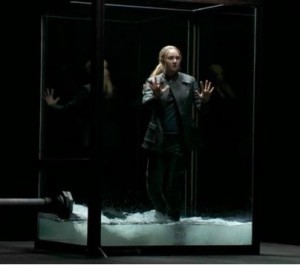
The book is always better than the movie–unless we’re talking about Divergent.
This well-known saying proves to be meaningless in this action-packed story surrounding your typical teen who doesn’t fit in. A few years ago when I first read Divergent, I was left feeling unimpressed and unfulfilled; Veronica Roth’s futuristic society divided into factions was ingenious, but the characters and their development was pathetic. We see much of the same in the film version, although there’s definitely much more to draw our attention.
Beatrice Prior is part of the faction Abnegation, centered around selflessness and commitment to helping others. She feels like she doesn’t belong–big surprise–so this ambitious teen moves from her faction to Dauntless (the brave kids who jump off buildings) despite the emotional stress it might cause her family. Maybe she does belong there.
The other three factions, Erudite, Candor, and Amity, represent other human virtues. Erudite is in the middle of trying to overthrow Abnegation’s authority. It can only end in robot soldiers.
And so arises the challenge for Tris to leave behind her old virtues and embrace her sense of recklessness, all while overcoming her fears. This Mulan-like transformation is cute–and the visualization of everyone’s fears is pretty interesting–but even so, it’s hard to warm up to her character. It’s unclear whether Shailene Woodley has simply failed to breathe life into Tris or if Roth has just created a hopelessly deadpan persona. Either way, there’s something about Woodley that turns me away–maybe it’s that blank Kristin Stewart stare, or how she fails to affect audiences in any role she takes on.

Though maybe one of Divergent‘s fatal flaws isn’t just Tris, but how much screen time is devoted to her relationship with Four (Theo James); something that feels feigned, unnatural, and rushed. And there isn’t much required out of Four’s character–the director most likely just told him to stand there and look pretty.
However, producers certainly make every scene out of this book come to life with a bang, something that even those who aren’t fans can look forward to. The concept of exploring human fears is definitely one of Divergent’s points of interest, and the visuals are quite impressive. The inclusion of a few well-known actors such as Kate Winslet and Miles Teller also helps to draw some attention (but don’t get your hopes up; Teller isn’t the funny guy this time around).
Even so, the book and movie’s theme of embracing who you are is particularly tiring, and the movie drags as we hear time and time again just how special Tris is. Yes, we get it. A divergent thinker is dangerous. But as I’ve learned from Twilight, it’s hard to appreciate the ideas behind a novel when the story is told from an obnoxious character’s point-of-view. This is what makes Roth’s novel so disappointing.
This movie is no Hunger Games, but it does have its points of interest. It’s a cookie-cutter dystopian film made for young teenage girls who just want to be different. And I’m not going to lie: by the end, I felt like I could climb a three-story building. It’s entertaining, but nothing spectacular in terms of freshness. Not to mention, Katniss would crush Tris in a fight. Score: 6.5/10.
Nataly Capote/A&E Editor
